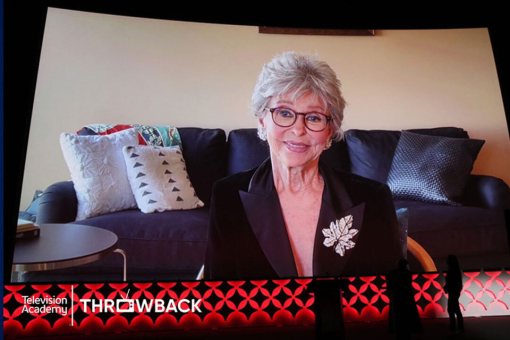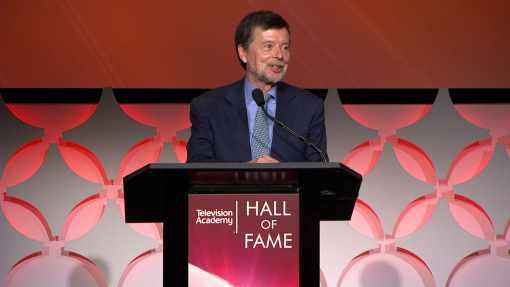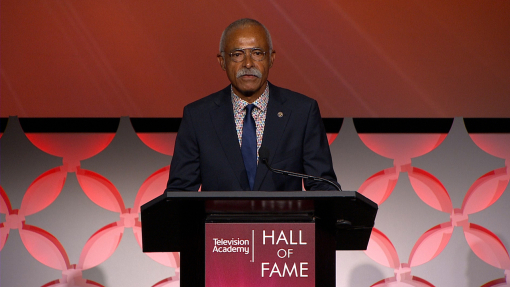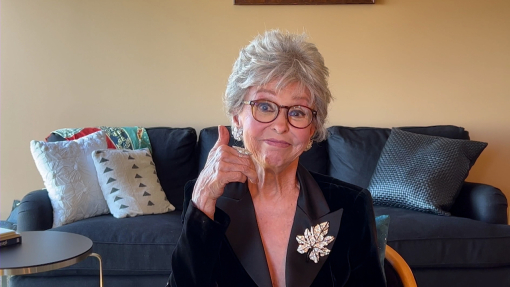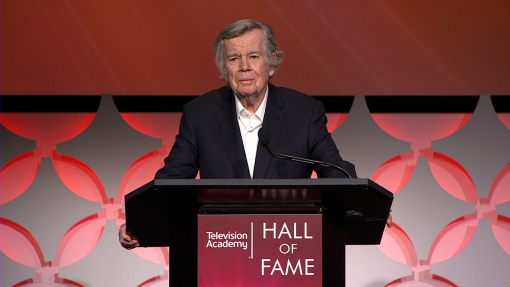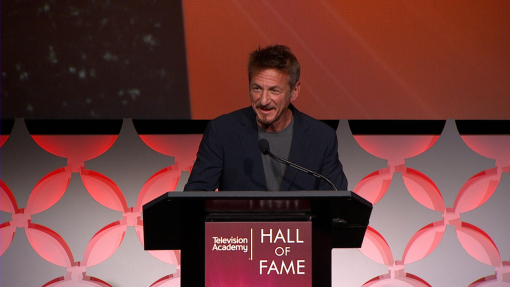Ask Ethel Winant how she did it, and she might tell you it was a potent mixture of naiveté and ignorance. She’ll probably leave out the stuff about being tough as nails, courageous, adaptable, curious and smart.
“When I first came to New York, I knew nothing,” is a typical Winant statement. Or things like, “I didn’t even know what a (producer/agent/casting director) was.”
Winant talks about her life candidly, matter-of-factly. She speaks of having riveted fighter planes together during World War II as if it were no more unusual than doing laundry. To hear her tell how she became the first woman executive of a network, not to mention one of the greatest producer-casting directors in TV history, able to claim credit for the success of bastions like The Mary Tyler Moore Show, The Twilight Zone, Playhouse 90 and Hawaii Five-0, you’d think it was no big deal. She even dispatches the fact that she is now legally blind in a few terse sentences.
“I’ve got macular degeneration. You usually don’t get it until your 70s. I was precocious and got it in my 60s. I have a closed-circuit TV thing. I hire drivers. I have assistants. For a few months I just sat in the room and cried. Then I went to the Braille Institute for a year, eight hours a day.”
She doesn’t mention that she became so adept at Braille that she eventually taught at the institute. This triumph, really, is a metaphor for Winant’s life: she not only met challenges, she devoured them. You want me to assemble a P-38? Well, show me how.
Her early years more portended a life in agriculture than high culture; she grew up in the farm town of Marysville, California, the daughter of a single mother during the Depression. But Janice Wolfson Wald, effectively widowed by a World War I veteran who lived most of his life in hospitals, was “an early feminist,” according to her daughter, who felt that women must have careers. She lived by her words, managing to get a job with the California Division of Highways at a time when there were few jobs for men, let alone ambitious women. Seems Mom camped out in the Governor’s office for three days until they gave her the civil service exam just to get rid of her.
“I loved Marysville. It was a wonderful farm community that raised peaches, walnuts, and rice,” Winant recalled wistfully. “It was enough of a small town that I could become very active in every part of the community. I think we were the only Jews that had ever been there! Everyone respected my mother because she worked hard and supported a daughter.”
Mom also exposed the small town kid to the arts, managing periodic trips to San Francisco to attend the theater. The little girl was spellbound; the experience was the most influential of her life. She fell in love with things thespian, acting in grammar school plays, joining drama society in high school (where she was mostly involved in production) and rushing to the library every month to read the latest copy of Theater Arts magazine. Naturally, when she enrolled at UC Berkeley, she was determined to study law. Or medicine.
“But I joined the Thespians [at Berkeley] and worked in all the behind-the-scenes theater activities available. One day a professor said to me, ‘You’re really good at this. Have you ever thought of doing it professionally?’ Well, it just never occurred to me because I didn’t even know there was such a thing as a profession.”
There was, and it was called producer. Next stop: the legendary Pasadena Playhouse. Winant applied for a scholarship, with the idea of taking a year off to see what professional theater life might be like. She got it, and wound up taking the rest of her life off to be involved with dramatic productions.
There were a few detours. At first, World War II was an advantage; with so many men off at war, she found herself painting scenery, running a light board, stage-managing, sweeping up. Eventually, the petite, bespectacled young woman felt the call of duty, too, and abandoned the playhouse for the warehouses of Lockheed Aircraft and that riveting gun.
While working in the graveyard shift at a facility on Central Avenue in South Central L.A., Winant also remained riveted to the theater. She formed a theatrical club with other graveyard shifters, linked up with director Robert Lewis, and somehow produced plays at theaters in downtown L.A. in the afternoons. (“Well, we just didn’t sleep a lot.”) Toward the end of the war, the riveter became an “expediter,” hunting down replacement parts for damaged aircraft. “It was like being a detective!” she recalls. When Lockheed stopped building the P-38 (“I loved it because it was a sexy airplane!”) and switched to jets, Winant switched careers and headed east. Her dream was to reach New York City “where the real theater was,” but the closest she got was East Hampton, where she taught at the Brearly School for Girls theater department. To make a Byzantine story short, she eventually met Theater Arts editor Roz Guilder, who suggested that Winant get a job working for an agent. (Her response: “What is an agent?”) Within weeks, Winant was taking dictation from famed theatrical agent William Liebling and his wife, literary agent Audrey Wood — dictation that involved script revisions by the likes of Tennessee Williams.
“Life is all about being in the right place at the right time, and dumb luck,” she declared. “New York after World War II was like Paris after World War I. Everyone came to New York! Taking Audrey’s dictation was the greatest course in script analysis in the world. She would get a Williams script, analyze it, give notes on how to shape it, and I would write that down.”
Subsequently she worked directly for Williams, rubbing elbows with such colleagues and contemporaries as author Truman Capote, musician Leonard Bernstein, author Carson McCullers, and actors John Houseman and Marlon Brando. Eventually, she stage-managed productions of Williams’ A Streetcar Named Desire in which Brando starred. It was a heady time: “I could get a table at Sardi’s, and my friends were all in the theater or were artists, or composers or costume designers. It was just the greatest life in the world!”
It was about to get better. Arguably the second-most influential moment of her life — file it just below her mom introducing her to the theater — was when her boss brought home something she’d never seen before: a television set. Winant was so overwhelmed with curiosity, specifically, about a live drama show called Studio One, that she decided to just drop in. “So I went over on a Saturday afternoon and walked into a television rehearsal. I thought I’d died and gone to heaven! There was so much energy. All I wanted to do was get a job in television, but I didn’t know anybody. So I just hung around Studio One.”
It was that simple. She hung around so much that people started asking her to fetch coffee. One Sunday, an actor didn’t show up, leaving the cast and crew in a tizzy. Well, I might know someone who can fill in, the unobtrusive lady ventured. Jaws dropped. Who was this coffee-fetcher? Winant phoned actor Frank Overton and he performed better than the guy who didn’t show. Lo and behold, she found herself consulted for other roles on the show — so much so, that her phone rang one morning with David Susskind on the other end, seeking a casting director for his Talent Associates. Seems he’d been told “there’s a really terrific casting director at Studio One.” Winant’s reaction? You guessed it: “I didn’t even know what a casting director was! But I figured, why not?”
Thus, luckily for TV, was officially born Ethel Winant, casting director. At Studio One, she had hired everyone from Yul Brynner to Charlton Heston and James Dean. At Talent Associates she casted shows like Armstrong Circle Theater, Appointment with Adventure, Justices, DuPont Show of the Week, and Mr. Peepers, with Wally Cox. In 1958, Winant got a call from Hollywood. A new live drama called Playhouse 90 was starting up, and a lot of the New York directors from Studio One were heading west. Would she like to join them? It was, said Winant, “the greatest break I ever had.”
If the Studio One New York years are hallowed in her memory, her four years at Playhouse 90 are gilded as the “most magical four years any of us ever had.” Why? A number of reasons, she will tell you, reasons like some of the “kids looking for work”: Paul Newman, James Dean, Steve McQueen, George Peppard, Jason Robards, Ben Gazarra, Rod Steiger, Jack Klugman, directors John Frankenheimer, George Roy Hill, Franklin Schaffner, Arthur Penn, Sidney Lumet, composer Jerry Goldsmith … She found herself back in an “unrecognizable” Los Angeles, working in a “great big studio” (Television City). The workload was 39 live dramas a year, 18 days of rehearsal for each. No matter: “We’d do a show and go to my house and have a cast party. If the show was wonderful, we’d have a wonderful party, and get up the next day and start over again. If the show was terrible, we’d have a wonderful party and get up the next day and start over again!”
The wonderful shows include (mercifully preserved) TV classics like Days of Wine and Roses (“the best show we ever did”), directed by Frankenheimer, with Piper Laurie and Cliff Robertson, Judgment at Nuremberg, Child of Our Time (the story of a kid lost in WWII, directed by Hill), and The Miracle Worker. There was the occasional clinker, like Manoletti, the story of the bullfighter. “We were insane,” said Winant. “We were trying to do a show about bullfighting, with the bull’s horns on the end of a stick! We thought we were invincible.”
After two years, she acquired both the title of associate producer and wife, when she married H.M. Wynant, an actor on Playhouse 90. When Playhouse 90 was canceled, she went off with Houseman to make movies for a while (Two Weeks in Another Town, All Fall Down) before landing at CBS, where Rod Serling asked her to cast The Twilight Zone. Oddly, it turned out to be one of her least favorite jobs: “I never liked the show,” she said. “I liked the pilot, with Gig Young. But they rehearsed three days and shot two, and I didn’t like to work that way.”
As CBS associate director of development (“or something like that”), Winant next helped the network come up with such ’60s staples as Lost in Space, Green Acres, Hogan’s Heroes, Medical Center, The Senator, Hawaii Five-0 … then was promptly fired, along with the whole development team. Or almost fired. The new CBS boss, Mike Dann, informed Winant that two people had thwarted her dismissal: Mssrs. William Paley and Frank Stanton. Seems she had attracted admirers in high places. (“I thought, ‘That’s the dumbest thing you could have said. Hey, I got it made, I’m not gonna quit. I’ll be here when you’re out of here!’”)
Briefly exiled to the Valley studios, Winant was brought back to Television City by veep Perry Lafferty, to take charge of casting for CBS Playhouse.
“Incredible tenaciousness,” Lafferty remembered. “She was incredible! When other people long ago would have given up, Ethel was still there. We were trying to get Mia Farrow to star in a movie of the week for CBS. She was then at the height of her career, having just come off Peyton Place. Farrow’s agents kept turning Ethel down. So Ethel did a wild end run and phoned Mia Farrow in London. Then she gave the script to a pilot for British Airways to take it overnight, got it to Farrow, who read it and told her agent she wanted to do it! This upset the agent no end.”
Winant’s appointment as the first woman vice-president of a network, in 1973, was a pleasant surprise — except for one little detail that the cigar-chomping, buffed-wingtip creatures at CBS seemed to have overlooked. “I went into Perry’s office and said, ‘I don’t want to seem ungrateful, but do I get a raise with this?’ He said, ‘Of course, you do.’ I said, ‘Well, I haven’t.’ He checked with New York, and after three or four months, I got a sort of token raise.”
This is a hint of the almost novelty status accorded women in television in those days — something that, Winant insists, never fazed her. “I never felt there was any gender prejudice in terms of making shows,” she said flatly. “Oh, there were problems, like having just one bathroom in the boardroom at CBS, and no lock on the door. So for a year and a half I would take the elevator down to the ladies’ room. One day, I decided to just leave my shoes outside the executive bathroom door. They got the message fairly quickly.”
She laughed slightly at the memory. “On the other hand, I considered being a woman an advantage. When [CBS Chairman William] Mr. Paley and his staff would come to L.A. for big meetings, they would come right across the room to me. If you had 50 names to remember, and there was only one woman present, well, it was a safe bet that I was probably Ethel. Mr. Paley would say, ‘Hello, Ethel, it’s been a long time.’ Since I was not stupid, I would say something like, ‘Oh, by the way, Mr. Paley, you remember Howard Adamson’ … and then I would feed the rest of the names to Mr. Paley. Otherwise, there were just forty guys in dark suits.”
Winant is hard-pressed to name her proudest achievement in television, but when pushed, allows that she has a “really soft spot” for The Mary Tyler Moore Show, for two reasons. First, it was not popular while being developed, and second, it afforded a kind of second chance to a lot of actors “whose careers had not gone as well as they might have.” Winant picked Cloris Leachman (“a brilliant actor”) and pushed for Moore over objections by people saying, “She can’t do comedy — she’s like Lassie’s mother.” Ted Knight’s career was stalled, Gavin MacLeod and Ed Asner “weren’t working as much as they should have been,” and there were doubts about Asner’s ability to do comedy. Valerie Harper was plucked from a local stage revue. Credit it all to Ethel Winant.
“The thing she really taught me was to always fight for what you believe in,” said Pam Dixon of Pam Dixon Casting, Winant’s assistant and protégé in the late seventies. “She would believe in something, and it didn’t matter if it was right or wrong. She would do everything in her power to get it done. She doesn’t get enough credit. Casting is probably the most unrewarding job — probably one of most important, but unrecognized.”
Winant subsequently cast The Waltons, Rhoda, Lou Grant and The Bob Newhart Show, and fought to make the CBS “Bicentennial Minutes” a reality:
“She and Louis Friedman came up with ‘Bicentennial Minutes,’” said Dixon. “Everyone thought they were crazy. They said it was like a commercial, how could you do that? She just fought and fought for it, and got it through eventually, and it turned out to be a very innovative kind of thing to do on television. And she never really got any credit for it, because you never saw credits for them at the end.”
Winant’s under-credited credits go on and on. She steered the docudramas The Migrants and Benjamin Franklin, became vice-president in charge of program development for the Children’s Television Workshop, eventually joined NBC as senior veep in charge of miniseries and novels for television, (where she fought to have the Japanese speak only their native language in the monumental mini-series, Shogun). In 1994, she teamed with David W. Rintels on the NBC miniseries, World War II: When Lions Roared, and for TNT’s critically hailed miniseries, Andersonville, directed by her old friend, Frankenheimer.
Most recently, Winant produced the Emmy-winning George Wallace for HBO, starring Gary Sinise, and was associate producer of Ronin, starring Robert De Niro (both also were directed by Frankenheimer).
She is now developing shows for Turner Entertainment. Over the years, she accumulated awards including a special Emmy for Playhouse 90, two Peabodys, the Humanitas Prize, the Christopher Award, the Alice Award, and the Crystal Award from Women in Film.
Performance, theater, and yes, TV, have carried over into her non-career “achievements,” that is, her three children (she divorced in the early seventies): William, an orchestral percussionist and soloist; Bruce, an “actor-gypsy” working in Ragtime; and Scott, creator-executive producer of ABC’s Cupid, and coexecutive producer of the much-loved series My So-Called Life.
Ask this indefatigable 76-year-old about being inducted into the Hall of Fame (a surprise; she thought she was being enlisted to help with the ceremonies), and you get the idea that it’s no greater an honor than the privilege of … just doing her job. “I love making shows,” she said.
“I love being on a set. I love working with writers. I think what actors do is magical. The talented directors can visualize. I think that I am the luckiest person in the world that I got to work in the medium I love, and with people I love … The Hall of Fame means an enormous amount to me, because I’m not the kind of person that is in the Hall of Fame. I’m just sort of a producer for hire.”
(Not to mention, a hell of a riveter.)
This tribute originally appeared in the Television Academy Hall of Fame program celebrating Ethel Winant's induction in 1999.

